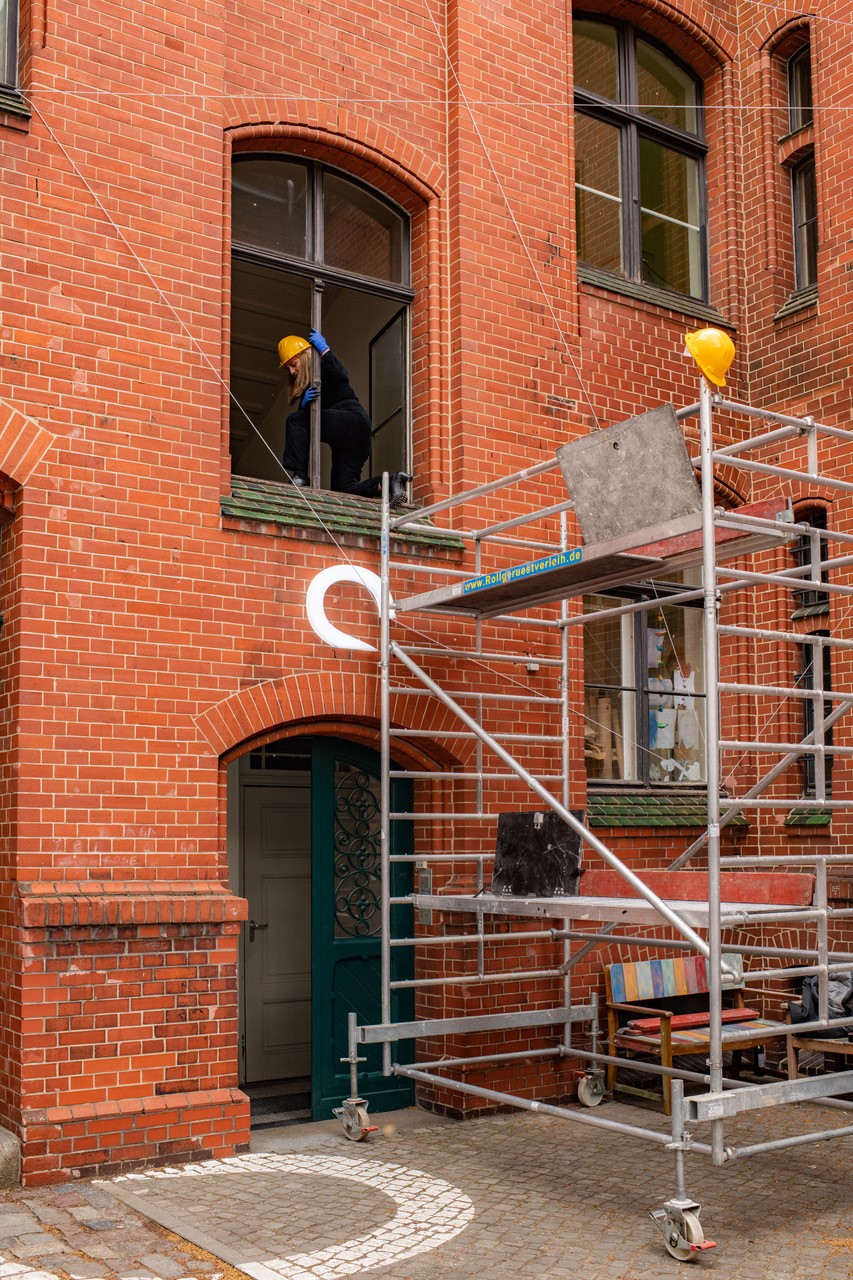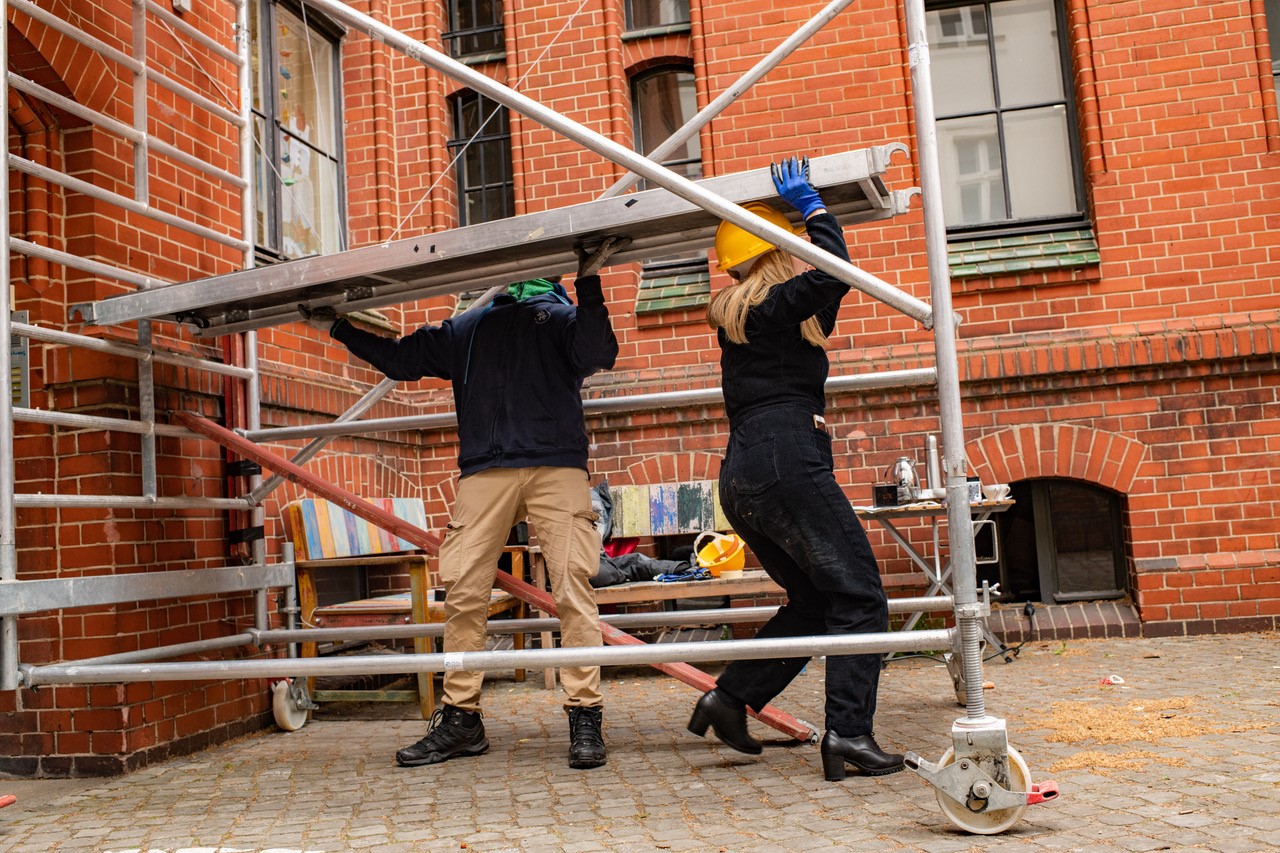At first glance, it may look like just another construction site: an aluminium scaffolding going up in front of Hamburger Bahnhof—Nationalgalerie der Gegenwart, cordoned off by caution tape. Yet a closer look reveals a multi-layered performance piece by Jelena Fužinato, developed in collaboration with Emily Finkelstein, Assistant Curator at the contemporary art institution, and Catalina Heroven, Research Associate at the General Directorate of the Staatliche Museen zu Berlin. The four-hour performance ›Incoming‹ (15 SEP 2024, 12pm–4pm, Hamburger Bahnhof—Nationalgalerie der Gegenwart) forms part of the intervention series ›Zoom Out: Contemporary Perspectives on the Threshold of the Museum‹, for which artists use site-specific interventions to explore belonging and exclusion at the intersection of the museum and urban society.
Fužinato’s contribution to the series shifts the focus to the overlooked and the often unnoticed, crafting a poetically nuanced critique of society. The workers erecting the scaffolding for the performance are artists from the Balkans who have come to Germany but—seen as mere outsiders by the elitist local art scene—find themselves pushed into other sectors of the economy, such as construction or care. It is in these ambivalences that Fužinato, who was born in Yugoslavia, grew up in Bosnia and now lives in Berlin, sees a link to her own family history: in the so-called privilege of being able to leave war-torn homelands for better pay as migrant workers, with the simultaneous harsh realities of precariousness, inaccessibility, and legal grey areas associated with their lives in Germany, Austria, and the Balkans.
Jelena Fužinato’s contribution to the series shifts the focus to the overlooked and the often unnoticed, crafting a poetically nuanced critique of society.
The performance forces visitors to pause and consider the seemingly mundane process of scaffolding—physical labour that must always be understood in relation to gender and (social) background. But what does it mean to raise such issues in an art context that is also steeped in mechanisms of exclusion? In the 1970s, the artist’s grandfather, a guest worker, was advised to learn 20 German words that would supposedly be the key to access and advantages in the workplace. As part of the performance, the construction area is encircled by a barrier tape that the artist has had printed with 20 English words that enable her own access to the global art scene—a poetic and self-ironic tribute to her grandfather. Words such as ›networking‹, ›funding‹, and ›sponsorship‹ make an appearance, evoking and bridging the gap between society’s inaccessibilities and those of the art world itself. Fužinato uses the scaffolding to penetrate the inner sanctum of the prestigious art institution in an investigation of the resilience, physical conditions, and codes required to make the art world accessible—especially as a female artist from a migrant background.
Having entered the building, the artist invites the two artist-turned-labourers to an artist talk held in the cloakroom of the institution’s east wing—a setting that underscores the reinterpretation and valorisation of overlooked spaces and types of work that enjoy the spotlight in the art world. Among the unassuming objects in the room are ready-mades that reflect the artist’s migrant family background, including a bag filled with essential and personal belongings. The artist remembers packed bags like this one always being at the ready throughout her childhood, in case they needed to leave in a hurry. Given the current political climate and rising xenophobia in Germany, the artist felt it necessary to prepare a similar bag for herself and her children.
›Incoming‹ is an invitation to take a closer look, to re-evaluate various forms of labour that sustain both society and the art world, to interrogate one’s own privilege, actively dismantle institutional barriers, and create new paths of institutional access.
Fužinato’s work echoes the feminist artistic tradition of the 1960s and 1970s, recalling for example Mierle Laderman Ukeles’s ›Maintenance Art‹ series, which recast both everyday care work and public maintenance as art and underscored their value as activities with relevance for society. At the same time, Fužinato emphasises that her approach always takes personal experience as its point of departure as opposed to theoretical references—a way of working that might well be described as auto-ethnographic. The uniqueness of this approach lies in the fact that, as per the feminist adage, the personal is always political. The experiences she draws on are never isolated, but always tied to wider social contexts and structural mechanisms of exclusion. ›Incoming‹ is in other words an invitation to take a closer look, to re-evaluate various forms of labour that sustain both society and the art world, to interrogate one’s own privilege, actively dismantle institutional barriers, and create new paths of institutional access.
A similarly ambivalent and at the same time poetic navigation of power structures, colonial history, migration, and gender also features in two Berlin Art Week performances held at KW Institute for Contemporary Art. Like that of Jelena Fužinato, Sarah Aviaja Hammeken’s dance performance ›Soil‹ on 14 SEP (2pm + 6pm) also draws on the artist’s personal experiences. The Copenhagen-born choreographer and dancer, with Danish and Greenlandic roots, explores the tension between ›the coloniser and the colonised‹—two seeming opposites that intersect in the history of her family. ›Soil‹ at KW is to be the first solo performance for Hammeken, whose practice is otherwise highly collaborative. The artist’s work is known for its translation of the ambiguous, vague, complex nature of global power dynamics, cultural identities, and indigenous cultures into a physical language that makes these concepts experienceable for an audience. The 40-minute performance sees Hammeken’s body move through a space filled with people, interacting with an installation made of earth.
›Soil‹ forms part of the programme of events accompanying the Pia Arke retrospective ›Arctic Hysteria‹, on view at KW until 20 OCT 2024. There is significant overlap between the two artistic practices. The artist, ethnographer, and researcher Pia Arke (1958—2007)—herself the daughter of a Greenlandic Inuk mother and a Danish father—is a pioneering feminist voice in Nordic and Arctic decolonial discourse and a key reference for Hammeken’s contemporary practice. From the 1980s until the turn of the millennium, Arke used images of and from Kalaallit Nunaat (Greenland) to explore the complex interplay between memory, space, identity, and myth. Photography, her primary medium, has historically served as a tool of colonial powers. She reclaimed it by integrating her often naked female body into the landscapes of her childhood with a self-determined, if fragile and poetic, aesthetic.
Arke illuminates her personal memories in the context of broader geopolitical questions about power dynamics, gender, and colonialism. As she herself put it in a text that appears in the exhibition catalogue: »In my works I have striven to investigate the importance of the little history in relation to the big history.«1 The premiere of ›Soil‹ will be an intriguing opportunity to see how Sarah Aviaja Hammeken reinterprets and develops the artistic, feminist, and decolonial threads of Arke’s work, continuing them through dance.
While Hammeken dispenses with spoken language, multidisciplinary artist Amina Szecsödy’s performance ›Mean Time‹ (15 SEP, 2pm and 6pm, KW Institute for Contemporary Art) places a premium on words and the female voice itself. The performance, presented as a kind of oracle, offers an immersive 30- to 45-minute experience in which she recites and reassembles fragments of words and text passages, sometimes distorting them into ethereal sounds. Szecsödy refers to her fragmented method as ›syphoning‹, as an inevitable and sometimes uncontrollable ›absorption‹ or ›vacuuming‹ of information from the vast pool that is her historical research material on women’s bodies and their voices; as subversive expressions within existing power structures. It is from these absorbed elements that she creates an atmospheric picture, one that evolves into a critical representation of the present. It is from this analysis of the present that the performer’s prophecies emerge, oscillating between dystopian and utopian future scenarios.
How can we, as political subjects and as recipients and producers of art, draw lessons from a present riddled with inequalities and emerge as active architects of the future?
Brazilian artist Luiz Roque mines a similar tension with his science-fiction-esque video works on queer (bio)politics, which remain on view in the ›Estufa‹ exhibition at KW until 20 OCT 2024. Szecsödy’s performance forms part of the programme accompanying Roque’s mid-career exhibition, as both practices aim not to develop definitive future scenarios, but to make the space between utopia and dystopia productive and to learn how to navigate it. As such, Szecsödy’s ›Mean Time‹ may evoke a sense of unease, discomfort and ambivalence, a multi-layered interpretation supported by the title itself: ›Mean Time‹ can refer to a fluid, transitional time, but also to the harsh, challenging present from which we must find a way out.
How can we, as political subjects and as recipients and producers of art, draw lessons from a present riddled with inequalities and emerge as active architects of the future? What energies do these varied performances convey, and which ones are harnessed effectively? For all their apparent differences, Jelena Fužinato’s ›Incoming‹ at Hamburger Bahnhof—Nationalgalerie der Gegenwart, Sarah Aviaja Hammeken’s ›Soil‹, and Amina Szecsödy’s ›Mean Time‹ at KW each subtly and poetically scratch the fragile surfaces of our time. None shies away from revealing uncomfortable facets of our relationships, power structures, and mechanisms of exclusion and inclusion. It is important that contemporary art institutions hold space for these complex tensions. What we, as viewers, are asked to do is to allow the personal narratives and ambiguities of these performances to resonate within us, and to use them as a springboard for exploring new ways of perceiving and acting in the present.
1 Pia Arke in: Ros Carter and Sofie Krogh Christensen, eds. ›Pia Arke‹. Southampton and Berlin: John Hansard Gallery and KW Institute for Contemporary Art, 2024.

